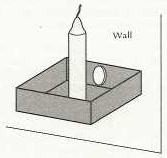
Everyone think that motivation and problem solving are driven by incentives... but it's not the case!
and here is why 🧵👇
and here is why 🧵👇

1.
The very first prove was an experiment in behavioral science, "the candle problem", created by psychologist Karl Duncker:
.a candle
.a box of thumbtacks
.some matches
The goal: to attach the candle to the wall so the wax doesn't drip onto the table.
The very first prove was an experiment in behavioral science, "the candle problem", created by psychologist Karl Duncker:
.a candle
.a box of thumbtacks
.some matches
The goal: to attach the candle to the wall so the wax doesn't drip onto the table.

2.
To solve the problem, the key was to overcome what's called "Functional fixedness":
-the inability to realize that something known to have a particular use may also be used to perform other functions-
in other words:
thumbtacks box <--> platform for the candle.
To solve the problem, the key was to overcome what's called "Functional fixedness":
-the inability to realize that something known to have a particular use may also be used to perform other functions-
in other words:
thumbtacks box <--> platform for the candle.

3.
Through this experiment a scientist named Sam Glucksberg proved the "inverse" power of incentives:
.two groups with different incentives
.the group with rewards take much time to solve the problem🤯
Through this experiment a scientist named Sam Glucksberg proved the "inverse" power of incentives:
.two groups with different incentives
.the group with rewards take much time to solve the problem🤯
4.
Rewards could work really well, but just in specific scenario:
.there is a simple set of rules
.there is a clear destination to go to.
Rewards narrow our focus and concentrate the mind, restricting our possibility when the solution is on the periphery.
Rewards could work really well, but just in specific scenario:
.there is a simple set of rules
.there is a clear destination to go to.
Rewards narrow our focus and concentrate the mind, restricting our possibility when the solution is on the periphery.
5.
So, this is the case:
when the task involves cognitive skill, financial incentives can result in a negative impact on overall performance.
This is a fact proved many times: despite this, there is a big mismatch between what science knows and what business does.
So, this is the case:
when the task involves cognitive skill, financial incentives can result in a negative impact on overall performance.
This is a fact proved many times: despite this, there is a big mismatch between what science knows and what business does.
6.
Actually there would be a more effective approach: it's built around intrinsic motivation.
Around the desire to do things:
.because they matter
.because we like it
.they are interesting
.they are part of something important.
Actually there would be a more effective approach: it's built around intrinsic motivation.
Around the desire to do things:
.because they matter
.because we like it
.they are interesting
.they are part of something important.
7.
It seems that we need to implement a new operating model based on the following building blocks:
.autonomy: direct our own lives
.mastery: get better at something that matters
.purpose: do what we do in the service of something larger than ourselves.
It seems that we need to implement a new operating model based on the following building blocks:
.autonomy: direct our own lives
.mastery: get better at something that matters
.purpose: do what we do in the service of something larger than ourselves.
8.
Take Google as a successful example:
at Google engineers can spend 20% of their time working on anything they want, with full autonomy over their time, task, team.
This radical amounts of autonomy produce about half of the new products in a year, like Gmail or Google News.
Take Google as a successful example:
at Google engineers can spend 20% of their time working on anything they want, with full autonomy over their time, task, team.
This radical amounts of autonomy produce about half of the new products in a year, like Gmail or Google News.
9.
So, if we get past this lazy, dangerous, ideology of carrots and sticks, it's possible to strengthen our businesses and solve a lot of those candle problems.
So, if we get past this lazy, dangerous, ideology of carrots and sticks, it's possible to strengthen our businesses and solve a lot of those candle problems.
credit to Dan Pink, for this beautiful speech 👇
ted.com/talks/dan_pink…
ted.com/talks/dan_pink…
in summary:
.incentives are often detrimental for motivation and problem solving skills
.science proves this fact many times with experiments like "the candle problem"
.a more effective approach than this "carrots and sticks" ideology it's built around intrinsic motivation
.incentives are often detrimental for motivation and problem solving skills
.science proves this fact many times with experiments like "the candle problem"
.a more effective approach than this "carrots and sticks" ideology it's built around intrinsic motivation
If you like this content, please share and make sure to follow @davevsamuel for new daily 🧵about business, mindset and behavioral economics.
• • •
Missing some Tweet in this thread? You can try to
force a refresh








